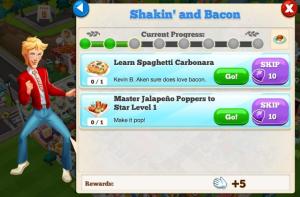Remember back when all our mothers came on Facebook and started playing Farmville? Well around that same time, Zynga released a game called Cafe World. It was a game about having a restaurant, making various dishes, and keeping your customers happy. I played it for awhile, because I was fascinated by the trend of social games at the time, and despite cooking like once a month in real life, I loooove cooking in games.
That was over five years ago. Fast forward to today when the landscape has changed. Facebook games still exist, but they aren’t really a thing anymore. Now it’s all about mobile. And mobile isn’t about farms and clicking (ok, well, a lot of it is actually) – it’s about puzzles and math and beauty and “real” games.
Except if you take a look at my tablet, it has Monument Valley and Star Wars: Uprising and Fallout Shelter, sure. But it also has a group of little icons labeled “Cooking.”
Recently, I really wanted to play a simple cooking game again. There’s something so satisfying about setting a dish to cook, coming back a couple hours later, and making a whole restaurant of people happy with my amazing Jalapeno-Bacon Poppers. And what’s more, it feels productive (even though it’s not), and it consumes my attention for just long enough to stop any other stressy thoughts from entering my brain. Just get the ingredients, choose what dishes to make, let the pot boil, as the cheesy music plays.
It feels a little like the gift of a Lotus-Eater in that I can waste so much time and feel so peaceful doing it.
The game I’ve mostly played (though I’ve downloaded FIVE (5!!!) variations on the cooking sim) is Restaurant Story 2 by Storm8, a company that makes a host of simple Match-3 games, casino games, and various other little simulation games for mobile. I don’t think very many people play these kinds of cooking sims anymore – if you look on the AppStore, most cooking games are all variations of Diner Dash now. Apparently, peacefully cooking over time wasn’t frantic enough for most mobile users or maybe the crap is coming to its end.
“We feel like we are participating in a great social idea, but we are truly isolated and lonely, and in the end, we are wasting our time. Our brains don’t naturally realize that what we’re doing is worthless, because these things are by their very design trying to trick us into thinking we are being productive and social. I say kill the crap actively, because evolution can make mistakes.”
What keeps me coming back to these games though is the quest system. The reason I stopped playing Cafe World years ago was because they created quests (fun!) but made them impossible to achieve without spending money (not fun). I’m an achiever, and I want to have the satisfaction of achieving something on my own, so naturally this did not appeal to me. Now today, in Restaurant Story 2, there are occasional events that require you to cook or master certain recipes, acquire ingredients, and accomplish certain objectives by a strict end date. THIS GETS ME. It’s possible to achieve these goals, but only with some diligence. If you only log in once a day, you will end far from the goal. So there’s that push to succeed at a challenging (in terms of time management at least) but obtainable goal, and then the end reward, which is usually a new recipe to cook. Who doesn’t love new recipes??
I sometimes wonder if these things appeal to me so much because the path to reach them is so clear. In my real life, work is about strategy and decision-making in a changing landscape. Will my choices impact people’s lives? Yes. Will they help them? I hope so, but I don’t know. In my personal life, I’m constantly juggling health, family, desire, and sleep. I never quite feel like I’ve figured it out, but I’m always trying to get somewhere, get better, get smarter, get a break. To have a goal that I can achieve with just a little persistence feels so achingly good that I truly do feel some guilt for feeling it.
So yes, there’s my guilty gaming pleasure these days. I mostly share it to give a fuller impression of the kind of person who plays a game like this – not just your non-gamer (grand)mothers – but also to raise a little flag for those mindless social games that can still play a meaningful role in someone’s life to feel better about myself.





 This is another entry in my series on social games – a nice, sterile term for those annoying applications that spam your Facebook News Feed. You know the kind – someone’s farm needs fertilizer, someone’s dog needs a treat, someone’s restaurant needs spices.
This is another entry in my series on social games – a nice, sterile term for those annoying applications that spam your Facebook News Feed. You know the kind – someone’s farm needs fertilizer, someone’s dog needs a treat, someone’s restaurant needs spices. In a “social game”, however, other players add substantively to player experience although its possible to play purely on one’s own.
In a “social game”, however, other players add substantively to player experience although its possible to play purely on one’s own. 


Recent Comments